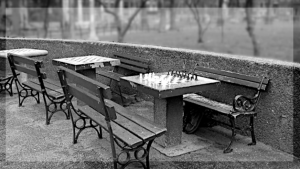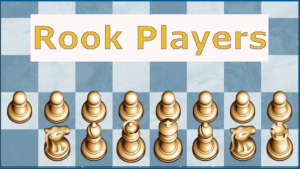Reuben Fine: Speed Demon
|
Today, especially on the Internet, fast games are probably more the rule than the exception. Most of the fast games played fall under the "Blitz" and "Bullet" or "Lightning" heading. Time clocks, particularly automatic ones such as chess servers use, allow for speed chess played at a specific time, such as 5 minutes, per game. Before the Internet, before clocks became the more-or-less rugged instruments we use today, Rapid Transit, a different kind of speed chess was most popular among speed chess enthusiasts. In Rapid Transit a player is allotted so much time, usually 10 seconds, per move and if he exceeds that time, even on the third move, he loses. Since different positions require more thinking than others, Rapid Transit is possibly the most difficult form of speed chess.

Reuben Fine, who gave up professional chess around 1951 to become a Freudian psychologist (he earned his PhD from USC in 1948), ending his amazing 20 year chess career, was possibly the greatest Rapid Transit player ever. I should add that Reuben Fine, for some quirky, intuitive reason, irks me and I doubt I would have liked him personally (although I've been wrong about such hunches before), but I can't deny or even downplay his phenomenal chess abilities. Fine cut his teeth on rapid transit in the weekly tournaments at the Marshall Club. Soon he was the recognized club expert, although in 1934 Capablanca entered and won, leaving 20-year-old Fine, Reshesky and Hanauer tied for the next three positions (Fine had been playing master level chess since he was about 16). Since they had nearly a 30 year age difference, when Fine finally reached his peak, Capablanca had already passed his.
Reuben Fine was the US Speed Champion for 4 straight years, 1942 through 1945. That's impressive enough but to add icing to the cake were his results: 
1942 
  The following two games were played at the 1942 U.S. Speed Championship: 1943 
  Reshevsky - Fine


 For winning the Championship 3 consecutive times, Fine took permanent possession of the Sturgis-Stephens Trophy.
   
1945  
 Fine won with 9 wins, 2 draws; Shainwit came in 2nd with 7 wins, 4 draws.  Donald Byrne only scored 2 wins, 1 draw out of his 11 games.

_________________________________________________________ Fine giving a 10 board blindfold simul. For most this would be extraordinary, but for Fine a regular blindfold simul was almost too easy. 
Fine gave a blindfold rapid transit simul on September, 1945 at the conclusion of the USA-USSR Radio Match. Fine played 4 boards at 10 sec./move. His opponents could think until he reached their board, giving them essentialy time odds of 30 sec./move to his 10 secs./move. Fine won all four games. The four games are given below. 
Reuben Fine writing about Rapid Transit in the March 1945 issue of "Chess Review:" 
Reuben Fine effectively retired from competitive chess in 1951. Time away from the pervasive chess scene took its toll. According the William Harston's obituary of Reuben Fine in the Independent on April 1, 1993, "He came briefly out of obscurity in 1963 to play a series of speed games against Bobby Fischer, which he lost narrowly."
According to the "NY Times," June 4, 1990 in an article by Robert McFadden called "Masters Mix Chess' Past and Fast Play," a group of masters gathered at the Metropolitan Museum of Art. |







